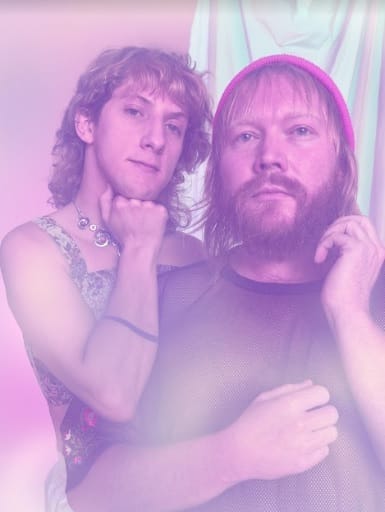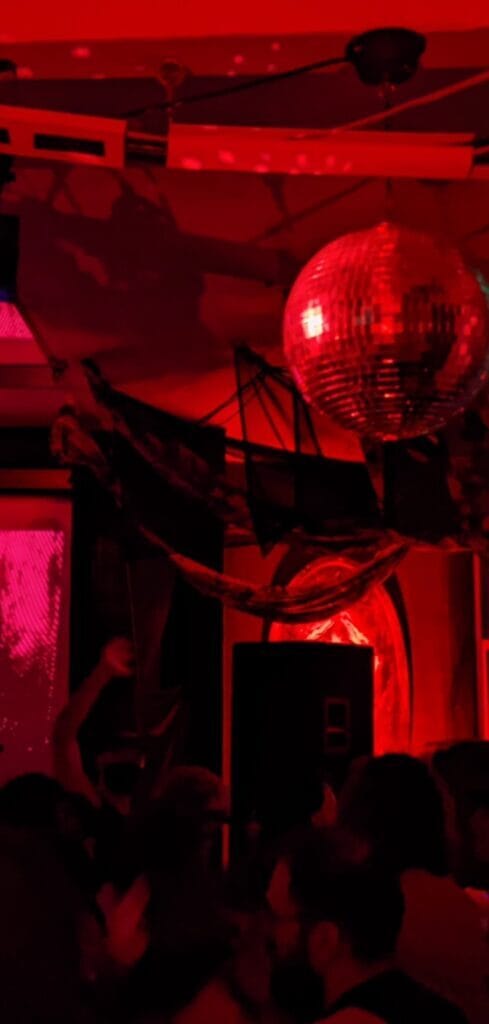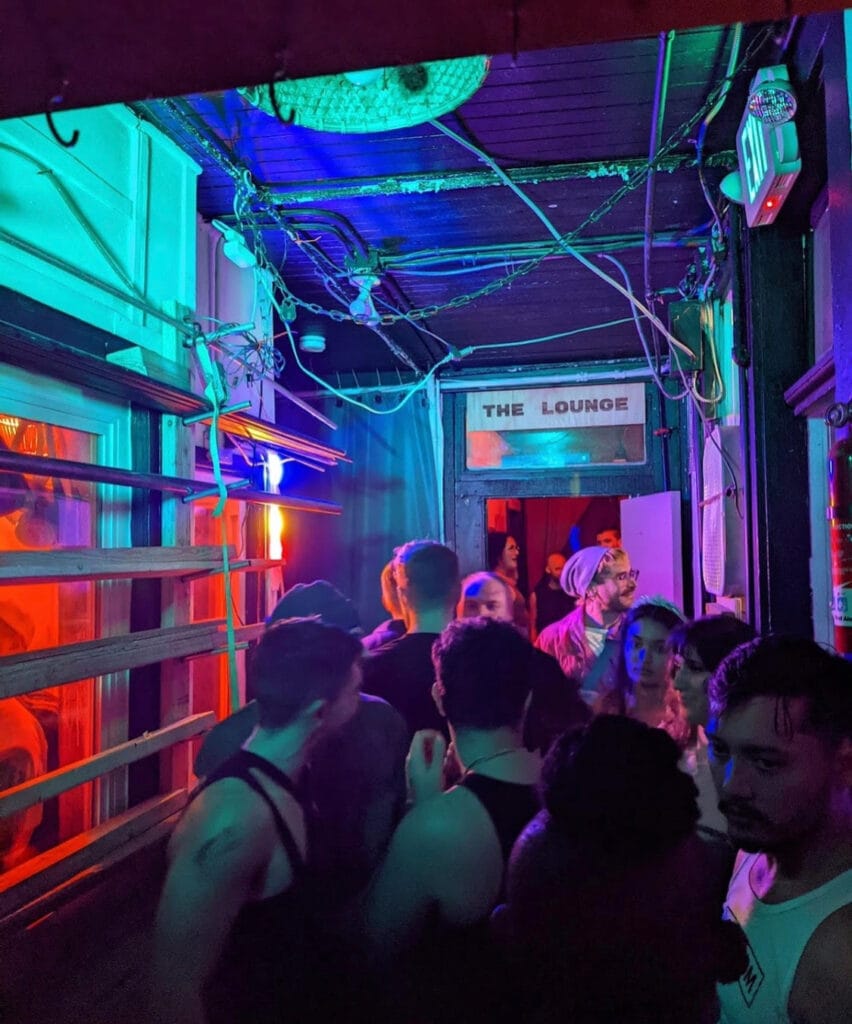
Club Pansy residents Sam Pierce aka AunteeSam (left) and Andrew Sieving aka Devereaux (right).
Queer DJ collaborative Club Pansy was born in a San Francisco basement not long after the pandemic began. In March 2020, friends and roommates @aunteesam (Sam Pierce) and Andrew Sieving (@andrewsandiego) passed the indefinite lockdown learning to DJ their favorite styles of dance music. Together the pair invested in controllers, loudspeakers, turntables and more, transforming the basement of their previous home into their very own rave cave. They took virtual lessons from a mutual friend and, with abundant time and passion to fine-tune their skills, rapidly gained fluency in house and techno.
Next they installed neon lights and tasteful decor. “We got a fog machine just for Andrew and I,” said Sam, “and we’d just dance around in our basement and piss off our straight roommates.”
Andrew laughed, remembering. “We couldn’t go out on Friday or Saturday or any night, so we played music and practiced.”
Both DJs had put down roots in the Bay Area’s underground dance scene well before their musical ambitions bore fruit. Sam first arrived in 2016. Their introduction to San Francisco’s queer nightlife took place at The Stud’s final location on Ninth and Harrison. Dance parties like GoBANG!, Mixed Forms, and Kosmetik were weekly occasions to make fast friends and artistic connections.
Sam describes themself as a “big behind-the-scenes person.” They attribute it to their Christian youth, having kept only the organized part of organized religion like most of us Southern ex-pat fags. The church-affiliated production teams Sam worked for across northern Alabama are many, and it’s where they first cultivated their filmmaking skills. Sam’s biggest musical inspirations include UK garage pioneer Midland, deep house OG Kerri Chandler, the Underground Resistance collective, and Joy Orbison, better known as Joy O. The subsequent cosmic tapestry of Sam’s electronic range captures the ecstatic heights and sweatier lows of the genres us party-goers crave.
A fellow Southern Belle, Andrew came to San Francisco from New Orleans by way of Latin America and South Korea. He’s drawn to rhythms innate in the world’s languages, and takes after DJs Pareja and Nicolá Cruz as well as the Kumbia Queers, interviewed by NPR in 2016. The result is a vast musical repertoire of bouncy house music and sunny instrumentals balanced by laconic tribal beats and dark techno. Andrew takes after the stylings of Djs Pareja, Prosumer, and Clark Price to name a few.
Soon after he arrived, Andrew quickly fell in with Jackie House, Bézier, and Jason Kendig of Honey Soundsystem. Andrew and Sam were among many who danced at the San Francisco DJ crews’ tightly-packed performances, often held on Sunday nights at Holy Cow, original home of The Stud (RIP). Sunday was chosen because virtually everyone involved, Andrew included, was off on Monday, the Saturday of bartenders and service workers alike.
“When you go to parties, you see a bunch of people you know and love, people you don’t get to see during the week when you’re working,” Andrew said. “It’s just a great way to connect—”
“—and it’s been happening for ages and ages,” added Sam.
Comparisons to church were inevitable, the Pentecostal vampires of our collective gay past still hissing in tongues. We winced at terms like spiritual and fellowship yet we could not avoid them. There was too much merit in the metaphor. Recalling an instant of memorable connection with others, Sam recounted an evening at The Stud, particularly the synergy between the crowd and the DJs.
“People were dancing in a line facing the DJ, still having those communal moments, but it was the beauty of a dance floor that was all about dancing. It wasn’t just meeting up with your friends and twirling in a circle like, ‘OMG I luv u sew much.’ It was about dancing together.”

by Caleb Morrell.
Enter March 2020, when the world gave over to a new and deadly virus. Two years of social deprivation served as a cocoon for Sam and Andrew’s talent. Learning to perform the music of happier days was more than a way to pass the time. They nourished a lifeform, one desperately missed by their peers in isolation here in San Francisco and abroad. Its post-lockdown flourishment depends entirely on COVID rates and ever-fluctuating state and federal mandates. Club Pansy’s first iterations were held entirely outdoors, when the vaccines we have today were still in their scientific infancies.
“The biggest difference between then and now is there’s a vaccine. Before, we were outside, everybody was wearing masks and getting tested continuously. As queer people I think we’re used to that when it comes to our sexuality, like getting on Truvada and going in for regular testing. It’s how you stay safe,” said Andrew.
As government policies yet again fail to protect queer people, responsibility for our social welfare falls on us. It’s a story we know too well. The shadow of the AIDS crisis touches us still, with continuing to wear masks in public being likened to condom use and respect for one’s autonomy.
“Now we’re at a different stage where it feels safer to go out to events because a lot of places are still requiring proof of vaccination, even if the city is not.”
Still, even with Andrew’s experience and Sam’s penchant for planning, there’s no preventing chaos from ever intervening. “Club Pansy is interesting because it’s unpredictable, and that’s what we like it to be,” Andrew said.
“One time we were in Nevada and someone had told Andrew to stop playing techno—no, it wasn’t ‘Stop playing techno,’ it was, ‘Can you please not fog out the house this time?’”
Sam and Andrew laughed.
“Within the first five minutes [that night], Andrew fogs out the whole house playing banging techno and all the fire alarms went off. People were fucking on an air mattress outside where all the neighbors could see them. It happened all at once.”
“I feel like behind every party there’s someone crying in a corner,” added Andrew. “You don’t see it, but there’s always someone with a plan B, plan C, and plan D, but that’s part of the chaos. That’s event production.”
Throwing a party is indeed a labor of love. DJs and promoters sink their own cash into making them happen, bringing more than just their talents to the table. They put their whole person in the mix, pulling from as far back as childhood to ensure that everyone has a good, safe time, a topic addressed by guest writer Elizabeth Dreeson last week in “Going Out Alone as a Woman in San Francisco.” Club Pansy books primarily trans, female, and POC performers because “there’s just so much talent” in the Bay Area queer dance scene. “It’s not a circuit party,” Sam said.
Circuit parties attract muscular, mainly white cis-men “in bulldog harnesses on GHB,” dancing to a generic “bumppah dum-pa, bumppah dum-pa” mock-tribal rhythm, we joked. The environment is infamously hostile to women, trans people, the unchiseled and unwealthy. Think White Party in Palm Springs or XLSIOR on Mykonos. Perhaps most upsetting is that the circuit party confab smacks of cult uniformity. “It’s just a certain type,” Andrew said. “There isn’t much diversity of bodies, of fashion. It’s just very carbon-copy, which is why I find it difficult.” Please feel free to go all-out with us. Your uniqueness is especially requested.

by Caleb Morrell.
DJs aren’t the only ones glad for the steady revival of the dance floor. Current and former partygoers are returning to the scene post-lockdown with conflicting emotions, optimistic if cautiously so. The heart of San Francisco’s queer community beats in 4×4 time after all.
“I feel like the pandemic gave a lot of people an opportunity to shift their priorities in a way that makes being in club spaces more fun,” said Sam’s close friend and roommate Sammy Raymond. Lockdown reminded us why we go, about “the importance of our friendships and the specialness of an experience we get to have in queer spaces, especially knowing what it’s like to go without it.”
Sammy’s partner, artist and new arrival to the city Stan Peck, feels similarly.
“I feel like it brought out a lot of baseline appreciation for what people are getting out of space like Club Pansy. I feel like, while some people were itching to get back, there were also people that realized they weren’t actually having fun anymore, so a lot of them took a step back and didn’t rejoin the parties for awhile. They’re slowly returning—not at the same pace as before, but with more intention. They feel like, ‘Okay, I know what I’m looking for now,’ and they’re not just going because it’s a party and ‘Obviously I go out every weekend.’ It’s like, this time I actually know I need to be surrounded by my people right now.”
It’s easy to get emotional, even religious about such things, yet only San Francisco’s inherent randomness can explain it. This is more than just a dance floor. Club Pansy is a queer church of sound, the House of More House, Please. Communion can be non-alcoholic if you wish, and the baptism of sweat and glitter is optional should you prefer a quiet vestibule away from the flashy congregation.
“You don’t find that a lot in the Bay Area. It’s just bars and clubs, and that’s why I feel like we’re doing something a little more special,” Sam said.
Through a variety of daytime and nighttime parties that in themselves contain multitudes, Club Pansy offers a container for it all. “Each of those containers is a different thing,” Andrew said. “Our party at El Río this Saturday is all about daytime, dancing, sunshine, bouncy house and looks-looks-looks, whereas other events are darker with more performances. It’s a different vibe altogether, and Club Pansy has all of those things.”
“We all know music is a universal language,” said Sam. “All cultures and religions have used music to bring people together, and that’s why it’s the thing that binds all of us, and it’s why we do what we do.”
Club Pansy residents AunteeSam and Devereaux (Andrew Sieving) will be curating vibes with special guests Five and Mutualism this Saturday afternoon, May 14, at El Río, from 2–8pm.
Edited 5/11 at 8:33 pm for corrections.
The post Love For This Club: A New Queer Collaborative Takes Off appeared first on Broke-Ass Stuart's Website.






